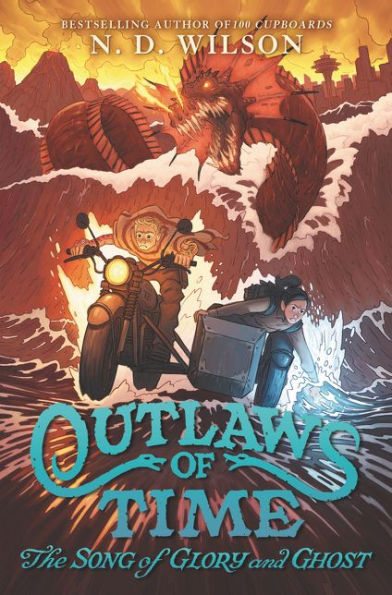One of the marks of a great writer is what Owen Barfield called “presence of mind,” which he used to describe his good friend C. S. Lewis. “What he thought about everything,” Barfield reflected, “was secretly present in what he said about anything.” Wherever Lewis went, there he was. The truths he believed resided so deep in his bones that they flowed inevitably into each story, sermon, poem, and letter.
By now N. D. Wilson has written enough that he can be declared to have this same presence of mind. His most beloved themes—distilled in his two nonfiction works, Notes from the Tilt-A-Whirl [read TGC’s review] and Death by Living [read TGC’s review]—are incarnated in each of his children’s novels: courage, self-sacrifice, thanksgiving, feasting, wonder at the world, laughter in the face of evil, joy in our own finitude, and faith in the God of perfect stories.
Facing Death
In his new middle-grade novel,The Song of Glory and Ghost (Book 2 in the Outlaws of Time series), the main themes are gratitude for old age and fearlessness in the face of death. The two go hand in hand. We are not meant to be young and wrinkle-free forever. Our bodies are meant to change, to be given away in daily deaths, to be “lovely as a ripened field; rich as an ancient tree still bearing fruit in her final season.”
The setting is a post-apocalyptic world largely destroyed by the evil Vulture, where lawless bands of survivors claim territories and camp out in abandoned mansions. This relentlessly popular motif (think The Walking Dead, The Maze Runner, The Last Ship) could easily feel clichéd, but Wilson wards off this temptation with a characteristically robust and inspiring cast (you’ve never met anyone quite like Ghost, hands down the best new character) and high-spirited theology.

The Outlaws of Time: The Song of Glory and Ghost
N. D. Wilson
In this book, the Vulture is wounded and dangerous. Young Peter Eagle is in mortal danger, and since he must grow up to become the old man who saves Samuel Miracle in Book 1, this puts Sam in mortal danger. And since Sam is the only one who can defeat the Vulture, the life of the entire world is at stake.
Enter Wilson’s new superhero, Glory. Equipped with terrifying new skills she can’t (yet) control, she must journey back in time and rescue Peter from the wrong death, thus preserving his future death as an old man in which he sacrifices himself to save Sam. Every superhero fumbles around with new powers at first, but forget Ironman accidentally torching a sports car or Spiderman missing a skyscraper—this isn’t fun and games. The scariest scene Wilson has ever written shows Glory testing her new gift.
Throw in revolting new villains, a redheaded fangirl, a bearded pirate with a questionable moral compass, the same entertaining Lost Boys (but with more screen time), hellish sea monsters, and a mysterious white-haired demon, and you’ve got the funnest middle-grade adventure I’ve read since, well, Book 1.
Dying on Purpose
Glory’s mission (and her gusto for it) reminds me of Gandalf’s oft-quoted words to Frodo: “All we have to do is decide what to do with the time that is given us.” Her mission also reminds me of a Boniface quote: “I know I shall die, and I shall die on time. Therefore, I must make the most of the moments between here and there.”
What does this mean? Our greatest mission is to die the deaths we’re meant to die. Every moment you live, you’re dying. How you live is, naturally, how you die. So if you’re living for others, you’re dying for them.
Peter dies multiple times. So does Sam. So can we. Die in the little, die in the big. Die when it doesn’t seem to matter. Dishes, diapers, car rides, housework, back rubs, talking with the nagging acquaintance who never has anything interesting to say. Spill your years like wine. Spend them like money lavished at Christmas. Give till you’re gone. Receive Glory’s charge: “Take up the life that is yours. Walk the lonely winding roads to the deaths that are yours. Live with open hands.”
When I wrote this review prior to the book launch last April, I, along with the rest of the world, was still in the dark about Wilson’s brain surgery to remove a tumor that was slowly, noiselessly killing him. I had no idea that he had just been summoned to incarnate his own theme in bolder strides than ever before. When he wrote the story, he himself had no idea. But looking back now, the way Book 2 seems to predict his trial is uncanny.
Having created characters who bravely walk to the deaths that are theirs, he then walked to the death that was his.
To remove the tumor, he lost an ear. It’s still attached, but quite dead to the world. All hearing—gone. A relatively small death to trade for your life, but a death nonetheless.
In Wilson’s video announcement on Facebook, you can see he cheerfully gave that ear back to God, from whence it came. His hands were open.
The Song of Glory and Its Ghost more than entertains. It calls us to come and die. The right death, the timely death, the daily death, is a crown. Welcome to its weight.
Live well, die well, and you will hear glory, hallelujah.






























